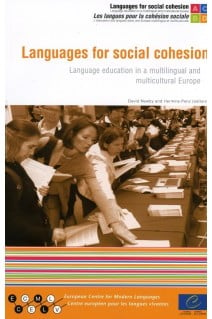



The ECML's "Languages for social cohesion" programme (2004-2007) involved approximately 4500 language professionals from Europe and beyond.This publication focuses on key developments in language education promoted through the work of the European Centre for Modern Languages of the Council of Europe (ECML). It serves three main functions. Firstly, it summarises the ECML's contributions to fostering linguistic and cultural diversity in European societies. Secondly, it contains the proceedings of the ECML Conference, held in September 2007 at the University of Graz, to communicate the results of this programme to the wider public. Thirdly, it provides a preview of the projects which comprise the next programme of the ECML (2008-2011): "Empowering language professionals: competences - networks - impact - quality".In this way the publication both provides an overview of current issues and trends in European language teaching and indicates perspectives for the future.
1. Editors' Foreword
2. Introduction
Languages for social cohesion: the 2004-2007 programme of the ECML
Section 1: Perspectives from the Council of Europe
3. Message to the ECML Conference 2007
4. The work of the Council of Europe in language policies and standards
Section 2: Conference keynote speakers
5. Language policy for cultural and social cohesion
6. Social cohesion and language learning
Section 3: The contribution of the projects of the ECML's 2004-2007 programme
7. The achievements of the "A" strand of projects: Coping with linguistic and social diversity: provisions, profiles, materials
8. The achievements of the "B" strand of projects: Communication in a multicultural society: the development of intercultural competence
9. The achievements of the "C" strand of projects: Professional development and reference tools
10. The achievements of the "D" strand of projects: Innovative approaches new technologies in the teaching and learning of languages
Section 4: External experts' contributions to the four thematic strands of the conference
Strand A: Coping with linguistic and social diversity
11. Multilingualism and mother tongue education in Umeå
12. Taking the minority language beyond the minority
13. Developing multilingual awareness amongst primary school children in Ireland: a case study
14. Teacher in-service training for minority language teachers: an Estonian example
Strand B: Communication in a multicultural society
15. Multimodal co-operation and academic identification in French as an Academic Language
16. (Inter)cultural awareness in the curriculum and the textbooks for state schools in Greece
Strand C: Professional development and reference tools
17. Les enseignants d'allemand et le plurilinguisme
18. Weltweite frühkindliche Vermittlung der deutschen Sprache
19. Enhancing the effectiveness of CLIL through writing
Strand D: Innovative approaches and new technologies
20. FLaChi - Foreign Languages for Children
21. ... from a distance: Teaching languages in a virtual environment
22. Online Language Teaching in the EU project "Problem SOLVE"
23. Deux sites innovants pour l'apprentissage des langues
Section 5: Results of the 2004-2007 programme from the perspective of European language associations and institutions
24. Language education in a multilingual and multicultural Europe: achievements and challenges from the point of view of CercleS
25. Language education in a multilingual and multicultural Europe: an FIPLV perspective
26. Language teaching in a multilingual and multicultural Europe: outcomes and challenges from the point of view of the FIPF
27. Towards plurilingual approaches in learning and teaching languages: an impression of the ECML's second medium-term programme
28. Language education in a multilingual, multicultural Europe: Irish issues
Section 6: Preview of the 2008-2011 programme: Empowering language professionals
29. Expected contributions of ECML projects in the area of evaluation
30. Expected contributions of ECML projects in the area of continuity in language learning
31. Expected contributions of ECML projects in the area of content and language education
32. Expected contribution of the ECML projects in the field of plurilingual education
33. Expected contribution of the new ECML projects to the implementation of language education policies in Europe
Section 7: Biographies of contributors
Section 8: Projects of the second medium-term programme of the ECML and their websites
Second medium-term programme, 2004-2007
Languages for social cohesion: language education in a multilingual and multicultural Europe
Section 9: Projects of the third medium-term programme, 2008-2011, and their websites
Empowering language professionals: competences - networks - impact - quality
Download an extract (1000)

The ECML's "Languages for social cohesion" programme (2004-2007) involved approximately 4500 language professionals from Europe and beyond.This publication focuses on key developments in language education promoted through the work of the European Centre for Modern Languages of the Council of Europe (ECML). It serves three main functions. Firstly, it summarises the ECML's contributions to fostering linguistic and cultural diversity in European societies. Secondly, it contains the proceedings of the ECML Conference, held in September 2007 at the University of Graz, to communicate the results of this programme to the wider public. Thirdly, it provides a preview of the projects which comprise the next programme of the ECML (2008-2011): "Empowering language professionals: competences - networks - impact - quality".In this way the publication both provides an overview of current issues and trends in European language teaching and indicates perspectives for the future.
Please note that in accordance with our terms & conditions, PDF/epubs may only be purchased by private individuals.
